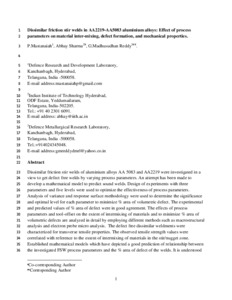P, Mastanaiah and Sharma, Abhay and Reddy, G M
(2016)
Dissimilar Friction Stir Welds in AA2219-AA5083 Aluminium Alloys: Effect of Process Parameters on Material Inter-Mixing, Defect Formation, and Mechanical Properties.
Transactions of the Indian Institute of Metals, 69 (7).
pp. 1397-1415.
ISSN 0972-2815
![[img]](http://raiithold.iith.ac.in/2121/1.hassmallThumbnailVersion/Transactions%20of%20the%20Indian%20Institute%20of%20Metals_69_7_1397-1415_2016.pdf)  Preview |
|
Text
Transactions of the Indian Institute of Metals_69_7_1397-1415_2016.pdf
- Accepted Version
Download (2MB)
| Preview
|
Abstract
Dissimilar friction stir welds of aluminium alloys AA5083 and AA2219 were investigated in a view to get defect free welds by varying process parameters. An attempt has been made to develop a mathematical model to predict sound welds. Design of experiments with three parameters and five levels were used to optimize the effectiveness of process parameters. Analysis of variance and response surface methodology were used to determine the significance and optimal level for each parameter to minimize % area of volumetric defect. The experimental and predicted values of % area of volumetric defect were in good agreement. The effects of process parameters and tool-offset on the extent of intermixing of materials and to minimize % area of volumetric defects were analyzed in detail by employing different methods such as macrostructural analysis and electron probe micro analysis. The defect free dissimilar weldments were characterized for transverse tensile properties. The observed tensile strength values were correlated with reference to the extent of intermixing of materials in the stir/nugget zone. Established mathematical models have depicted a good prediction of relationship between the investigated FSW process parameters and the % area of defect of the welds. It is understood that the mixing pattern in nugget zone and further joint strength are primarily affected by the tool offset and welding parameters.
Actions (login required)
 |
View Item |


 Altmetric
Altmetric Altmetric
Altmetric